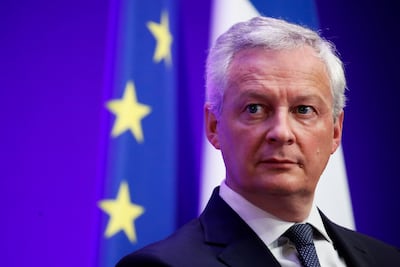Ireland is willing to raise its minimum tax rate for multinational corporations to 15 per cent, France’s finance minister said.
Bruno Le Maire made the comments before an international meeting on the matter on Friday.
Ireland’s corporation tax rate is currently 12.5 per cent, one of the lowest in the EU. This has come under scrutiny since an international agreement was signed by more than 130 countries in July.
Speculation is mounting that Dublin will reverse its position and agree to the draft Organisation for Economic Co-operation and Development tax proposals as early as this week.
“A compromise might be reached around a 15 per cent effective tax rate,” Mr Le Maire said in a conference call.
That “would eliminate attractive effective tax rates on the order of two, five or six per cent that are offered by certain countries, including [those] in the European Union”.
Mr Le Maire said it was “not the rate that poses the most difficulties” but the language surrounding the deal.
He said “real political difficulties” remained and that such obstacles should not be underestimated.
“I’m fully determined to pave the way for a consensus because we are one millimetre away from a global agreement on a new international taxation system for the 21st century, and we should not lose the opportunity to build this new taxation system,” Mr Le Maire told CNBC.
“We could, either next week during the Washington meetings or at the G20 meeting in Rome at the end of October, sign the final agreement under the international taxation system.”

On Wednesday, Foreign Affairs Minister Simon Coveney said he was “hopeful” a deal could be reached.
“The expectation now is that the OECD meeting on Friday will finalise a new framework and basis for international corporate tax,” he said.
“I am hopeful that Ireland can be part of supporting this new measure, but we have to wait for for the final text, which hopefully will be available later on this evening.”
A change to its tax regime would bring Ireland in line with its EU partners. These have demanded a uniform rate to prevent tax avoidance by some of the world’s biggest companies, such as Amazon and Facebook.
The July breakthrough envisaged the minimum 15 per cent tax rate applying to multinationals with at least €750 million ($865.5m) in sales, which in practice would hit many big tech companies.
Mr Coveney repeated a fear, expressed by other senior government figures in recent weeks, that failure to back the deal would isolate Ireland in the international community.
“Ireland does not want to be isolated in this space, but, at the same time, we certainly want to ensure that the view that we have in relation to tax, which is a view that many other small countries rely on us to to make, is properly heard.
“We have asked for some reasonable changes that can provide as much certainty as possible in terms of managing the Irish economy going forward,” he told state broadcaster RTE.
Ireland enticed many companies to set up their European headquarters in the country with a 12.5 per cent corporate tax rate that in practice can be lowered.
“It will be difficult to go above” 15 per cent without losing the holdouts completely, a source close to the talks said.
The other pillar of the reform would give countries a share of the taxes on profits earned in their territory.
The objective of the Friday meeting is to bring on board the holdouts, which include Hungary and Estonia as well as Ireland, to allow the minimum tax rate to go into effect in 2023. It is being held under the auspices of the OECD, which has been shepherding the talks.
Several countries are ready to move forward with national taxes on tech companies if a minimum tax deal is not reached at an international level.


